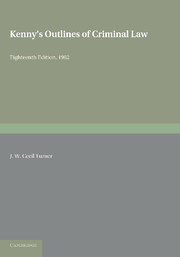Book contents
- Frontmatter
- Preface to the Sixteenth Edition
- Preface to The Seventeenth Edition
- Preface to the Eighteenth Edition
- Contents
- Index of cases
- Index to the principal statutes
- List of principal books cited
- BOOK I GENERAL CONSIDERATIONS
- BOOK II DEFINITIONS OF PARTICULAR CRIMES
- BOOK III MODES OF JUDICIAL PROOF
- BOOK IV CRIMINAL PROCEDURE
- CHAPTER XXIX LIMITATIONS ON CRIMINAL JURISDICTION
- CHAPTER XXX CRIMINAL COURTS
- CHAPTER XXXI SUMMARY PROCEDURE
- CHAPTER XXXII ORDINARY PROCEDURE
- CHAPTER XXXIII ORDINARY PROCEDURE
- CHAPTER XXXIV ORDINARY PROCEDURE
- Appendix I The meaning of ‘credit’
- Appendix II II Rules as to admission of evidence which reveals to the jury facts discreditable to the person accused
- Appendix III III Forms of indictment
- Index
CHAPTER XXX - CRIMINAL COURTS
from BOOK IV - CRIMINAL PROCEDURE
Published online by Cambridge University Press: 05 June 2016
- Frontmatter
- Preface to the Sixteenth Edition
- Preface to The Seventeenth Edition
- Preface to the Eighteenth Edition
- Contents
- Index of cases
- Index to the principal statutes
- List of principal books cited
- BOOK I GENERAL CONSIDERATIONS
- BOOK II DEFINITIONS OF PARTICULAR CRIMES
- BOOK III MODES OF JUDICIAL PROOF
- BOOK IV CRIMINAL PROCEDURE
- CHAPTER XXIX LIMITATIONS ON CRIMINAL JURISDICTION
- CHAPTER XXX CRIMINAL COURTS
- CHAPTER XXXI SUMMARY PROCEDURE
- CHAPTER XXXII ORDINARY PROCEDURE
- CHAPTER XXXIII ORDINARY PROCEDURE
- CHAPTER XXXIV ORDINARY PROCEDURE
- Appendix I The meaning of ‘credit’
- Appendix II II Rules as to admission of evidence which reveals to the jury facts discreditable to the person accused
- Appendix III III Forms of indictment
- Index
Summary
Section I. The High Court of the Queen in Parliament
The various courts that possess a general criminal jurisdiction will now be considered in the order of their dignity, beginning with the highest court in the realm. Its title must not mislead the student into supposing either that the Queen sits there in person, or that the word ‘Parliament’ is used in the usual modern sense, as including the House of Commons. But a Parliament, sitting without the Sovereign or the Commons, becomes simply the House of Lords, by which, accordingly, the jurisdiction of this court is exercised. That jurisdiction is twofold: (a) as a court of appeal, and (b) as a court of first instance.
AS A COURT OF APPEAL
In civil matters the House of Lords is the only final court of appeal on all questions of law from English secular tribunals. But in criminal causes it is only one, and far the less active, of two such courts. Until 1907 its functions of appeal were limited to those extremely rare cases of error of law apparent on the record itself. Such an error would appear in any indictment that disclosed no crime. But the Act of 19072 which created the new Court of Criminal Appeal provided that from it there might be an appeal to the House of Lords by either the prosecution or the defence on any point of law which the Attorney- General should certify to be of such exceptional public importance that it would be desirable ‘in the public interest’ to have the highest decision on it.
- Type
- Chapter
- Information
- Kenny's Outlines of Criminal Law , pp. 537 - 547Publisher: Cambridge University PressPrint publication year: 2013



